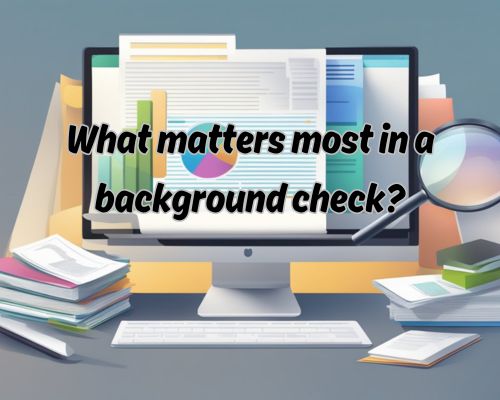
What Matters Most in a Background Check? Key Factors to ConsiderWhat Matters Most in a Background Check? Key Factors to Consider
When navigating the intricate landscape of background checks, understanding the key components can make a significant difference for both employers and job seekers.
The most critical aspect of a background check is the alignment between the candidate’s history and the specific requirements of the job.
This includes verifying employment history, education credentials, and ensuring there are no disqualifying entries in their criminal record.

For employers, the pre-employment screening becomes a crucial step in making informed hiring decisions. It helps confirm the qualifications and history of applicants, safeguarding the company’s integrity and minimizing risks.
On the other hand, as a job seeker, being prepared to present your information honestly and transparently during the hiring process will enhance your credibility and increase your chances of success.
Fundamentals of Background Checks
In employment, background checks are essential to assess candidates’ lives, experiences, and trustworthiness. These checks ensure safety, legal compliance, and suitability for specific roles. Let us get on to these with Charles Jimerson from Private Investigator West Palm Beach.
Understanding the Scope and Legal Compliance
A comprehensive background check looks beyond just criminal records to include identity verification and other personal information.
Pre-employment background checks may involve gathering details such as employment history, educational background, and credit reports.
Legal compliance is crucial, governed by laws like the Fair Credit Reporting Act (FCRA), which ensures fair practices. Meanwhile, the Equal Employment Opportunity Commission (EEOC) also plays a vital role in safeguarding against discrimination in background screening processes.
You’re obligated to adhere to these regulations to respect candidates’ rights and avoid legal complications.
Components of a Background Check
Employment background screening typically comprises several components based on the job’s requirements.
Criminal record checks are common to identify potential risks. Meanwhile, employment and education verifications help confirm candidates’ qualifications.
Checks may include a credit report to evaluate financial reliability, especially for financial roles. Motor vehicle records are checked if a driving role is involved. Sometimes, verifying professional licenses is necessary for positions where certifications are required.
Gathering this data provides a holistic view to gauge a candidate’s overall suitability.
Accuracy and Dispute Resolution
Ensuring the accuracy of background reports is essential, as errors can affect employment decisions.
You should regularly verify reports against reliable databases to maintain accuracy. If discrepancies arise, individuals have the right to dispute inaccuracies under the FCRA.
Begin by notifying the background reporting company, which must investigate and correct errors. Then, inform the employer of any corrections to ensure transparency.
Staying vigilant about accuracy safeguards against potentially unjust negative outcomes in employment decisions, providing a fair process for all parties.
Detailed Background Check Components
When conducting a detailed background check, it’s crucial to focus on verifying identity and employment eligibility, understanding a candidate’s criminal and financial history, and validating education, licenses, and driving records. Each aspect plays a significant role in ensuring a comprehensive evaluation. Let us get to know these with Charles Jimerson from Private Investigator West Palm Beach.
Verifying Identity and Employment Eligibility
A thorough identity check confirms that a candidate is who they claim to be. This often involves social security number verification and reviewing aliases.
Background check services typically compare personal information against public records to assess consistency.
Employment verification is also critical. Contacting previous employers helps confirm job history, job titles, and professional references.
Employers must ensure that applicants meet eligibility requirements to prevent negligent hiring lawsuits. Verifying work authorization protects against hiring ineligible individuals.
Assessing Candidate’s Criminal and Financial History
Understanding a candidate’s past involves examining both criminal and financial histories.
A criminal background check reviews court records, arrest records, and any criminal records for serious offenses. This helps assess a candidate’s potential risk, including litigation related to negligent hiring.
A financial history review typically includes credit reports. This aspect is crucial for positions involving financial responsibilities, ensuring that there are no risky tendencies. Meanwhile, checks against a civil history database highlight any past bankruptcies or liens that may be relevant to the job’s demands.
Checking Education, Licenses, and Driving Records
Educational background checks are vital for verifying degrees and qualifications. A detailed education verification aligns an applicant’s claimed credentials with actual records from educational institutions.
Employers often require this to validate competencies listed on a job application.
Professional licenses must be current and valid. Verifying these credentials ensures that candidates meet regulatory standards in their field.
Additionally, reviewing driving records is important for roles that involve transportation tasks. These checks identify any history of offenses that could impact job performance.